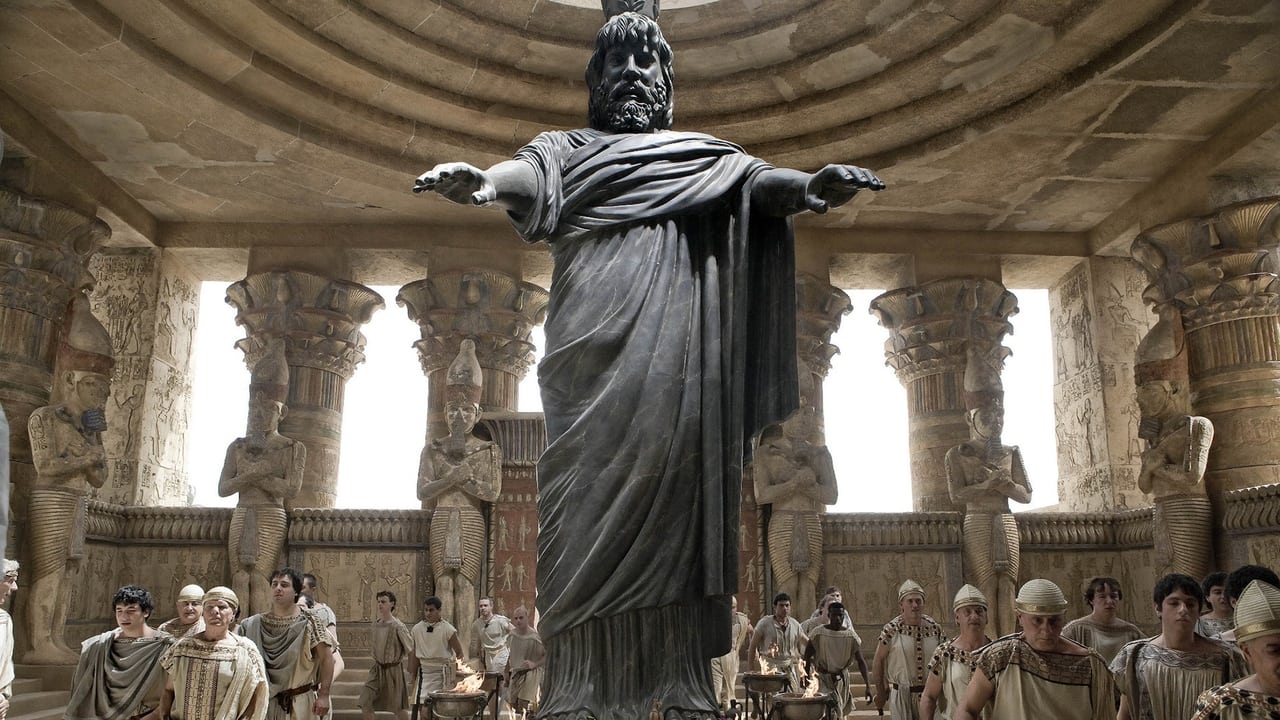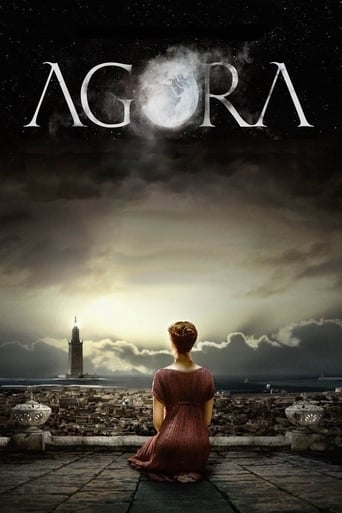

This is one of the worst ( and I mean that - w o r s t) movies of all times. The merits are few, but it all is undermined by a blatant, loud, crude and crass agenda - it is all lies that try to depict early Christians as a mob of science-haters, wild fanatics and wanton murderers. Lies, and no acting, no props, no FXs and no efforts can save this mesh from a disaster. This is all lies, and I must say, I hated wasted time and the movie What is sad, with time, such films will become numerous and loud. This is a vivid example of how history is distorted and how truth is replaced with a pure lie. This movie can be seen once as an example of pseudo-accurate depiction of very dubious facts
... View MoreThis movie depicts 4th century Alexendria at a time when its streets were crowded with Greek philosophers, Ptolemaic Egyptians, Roman soldiers, Jews and early Christians. We focus on the library, although there was so much more to this important city at this time.The film succeeds spectacularly in bringing this to life. This alone makes the movie worth watching.But even more than that, the movie tells a story based on a series of events involving group of historical figures: Theon, Hypatia, Orestes, St Cyril of Alexandria and others. Hypatia is the interesting one here, passionately and credibly played by Rachel Weisz. The movie is not quite historically accurate, but it is a hell of a good story based loosely on historical events.But wait, even more than that, the film has religious fundamentalism and intolerance as its main theme. I guess you could say it takes the side of science over religion, freedom over faith, reason over madness. It shows the exact moment we entered the Dark Ages.In my second viewing, I came to appreciate Oscar Isaac's performance even more. He is a wonderful actor. The really powerful character here is Davus. I'm not sure this fascinating, complex character was properly fleshed out in the script, but it was a tremendous performance by Max Minghella.I absolutely loved this intelligent, moving and important movie. I wish all movies were like this. I didn't want the movie to end. They should use it as the basis for a mini-series.
... View MoreWhen the movie started, I decided that I would put my knowledge about Hypatia aside and give a chance to this attempt at telling her story. Even though that choice allowed me to enjoy the film, I was still disappointed by yet another blatant use of this woman's name in order to promote a certain idea.Historical inaccuracy aside, this is an expertly directed film, with excellent shots, literal and symbolic narrative, on point music and beautiful cinematography. The script's message hits you a bit over the head with the black- robed parabolani, the over-the-top dramatization of the destruction of the Serapeum, the very European "good guys" and the very Middle East Christians. Yeah, we got it already.On the downside, first of all, this movie about Hypatia doesn't tell Hypatia's story. This Hypatia is a modernized and very tuned down version of the real woman. And even though Rachel Weisz does an excellent job with the material that was given to her, giving us an utterly charming, absent minded, driven and powerful in a very dignified and quiet way scholar, that character is not Hypatia.Hypatia was first and foremost a philosopher, a neoplatonist. Hypatia had such deep faith in Plato's teachings, her whole life revolved around it. Her moral code was so high and similar to the teachings of Christianity, her integrity was such that gave her "immunity" to the religious battles that were raging in the city. Many of her students were influential Christians, who later joined what they learned from her with Christian faith. She was so knowledgeable, ethical, just and wise, her influence in the political and social circles was equal to that of the archbishop. Powerful stuff for that time. Which brings us to the reason behind her murder. Political jealousy it was, plain and simple. There was no battle between science and religion taking place, no feministic tendencies or unrealistic scientific revelations.In conclusion, even though, as I said, this is a solid film with a positive message, the way it is delivered is lacking. By using a historical figure and manipulating her story in order to serve the movie's purpose, these people became no better than the people they try to condemn. And please humanity, if you have nothing truthful or of any actual historic value to add, leave Hypatia alone. She's been your poster girl for 100 different purposes these last 500 years. A woman of value ended up being remembered for her brutal murder and not for her extraordinary life. There's a point where enough is enough.
... View MoreHere we have a film about center, meaning, different pathways to truth. So let's find our own.The film caused an uproar about its historical accuracy. The obvious thing to say is that Christians did not burn the Library and I suspect more scholarly knowledge than mine will turn up inaccuracies at every step. It should be also noted that the film is careful to point that the Library being destroyed is not the world famous monument, but a smaller one at the Serapeum that survived the first, though the outcome is the same: the loss of classical knowledge.It seems clear however that the dramatization is used to sketch a broader shift of world from antiquity to the middle ages, and this shift was no less violent and arbitrary across the Eastern Empire than what is essentially shown in the film. If we can accept that the specific events are of course fictional, all films are, yet the broader sketch captures a model that is not far from recorded truth we are a step closer to what this is.In its dramatic fabric the film is for the most part ordinary Gladiator- fare. Sorrow and sacrifice, bonds snapped by violent pulls. But if we pull further back?What attracts me here is the filmmaker's attempt to find a more cosmic view. The film opens with a majestic shot of Earth rolling in space and we swoop below to find the petty human world where people despair about love and debate god. We have several aerial shots of the destruction where tiny particle-like figures of rioters flush through the stark geometric order. The film is all about finding pattern in human madness. Primitive religion against primitive science, different paths to pinpoint a universal center. Here we need to say something clearly. The film promulgates a distinction between a science of pure reason and a more or less blind religious impulse. It aims to show a fanatical, irrational religion at work, this of course has been a reality, still is. It does give a wonderful impression of the appeal of early Christianity as a communist revolution of the poor and downtrodden against the smugly powerful, both vital and senseless, and the process of its turning into another hierarchy.This common distinction between science and religion however obscures an interconnected truth. That both, before petering out in institutionalism and scholastic debate, are driven by a profound cosmic feeling to describe the human experience. And although the observations differ, both have to construct their center.This was the great concern behind attempts to model the solar system up until and including Newton, just where to place the center and the metaphysical implication this carried about life. Both Kepler and Newton were deeply religious, the heavenly mechanics they uncovered didn't banish god, merely pushed him at a greater distance. There was great joy that precise and knowable mathematics resided in the mind of god, but the laws were still god's. Newton spent inordinate time trying to calculate absurd things like the exact area covered by the Biblical heaven.What this all means is that science turns up facts, reason finds symmetries and coherence, but it always falls on us to construct a framework of understanding that, hopefully, jives with the way things are in a fundamental way. In terms of the film (and every film), it means you have to find your center, if any, and decide on the value. Here for me it's not the specific history, forged or not. It's not the dramatic arch. It's that cosmic view of a broader human journey through the ages caught between the profound awe of looking up at the sky and the horror of how controvertible our concepts can be at the hands of people. It's not a matter of science against religion, science can be as fanatic about its findings and as obstinate to change. It's a matter of clarity against ignorance.
... View More